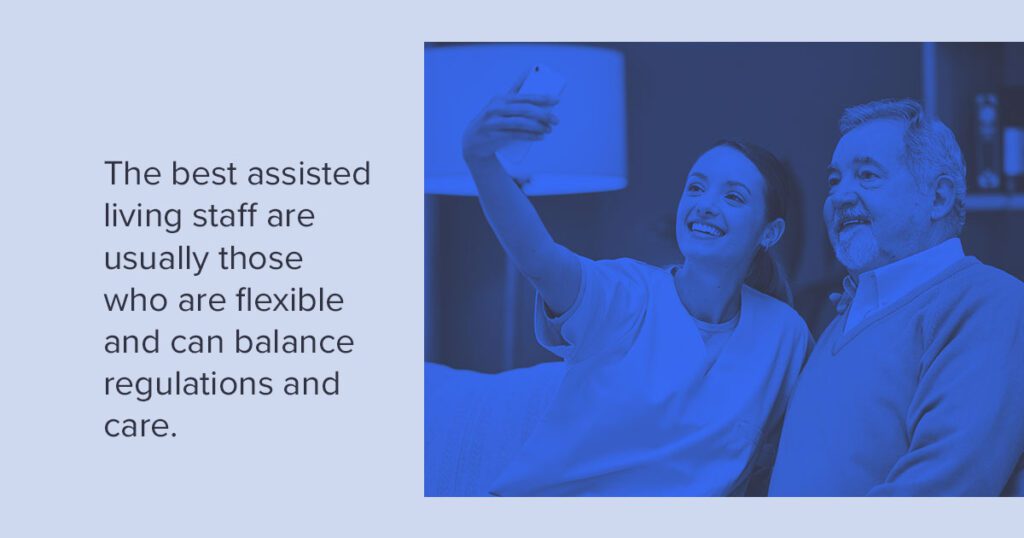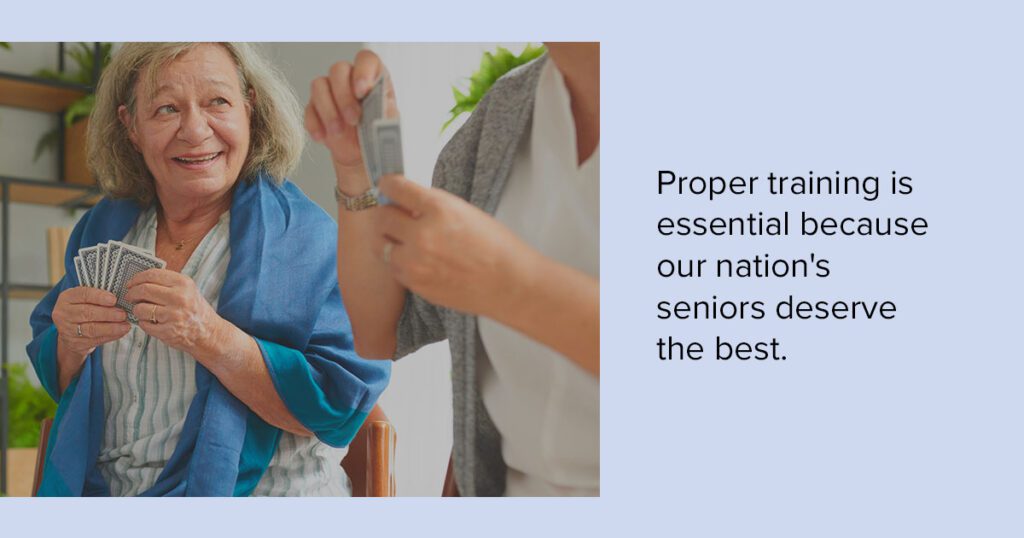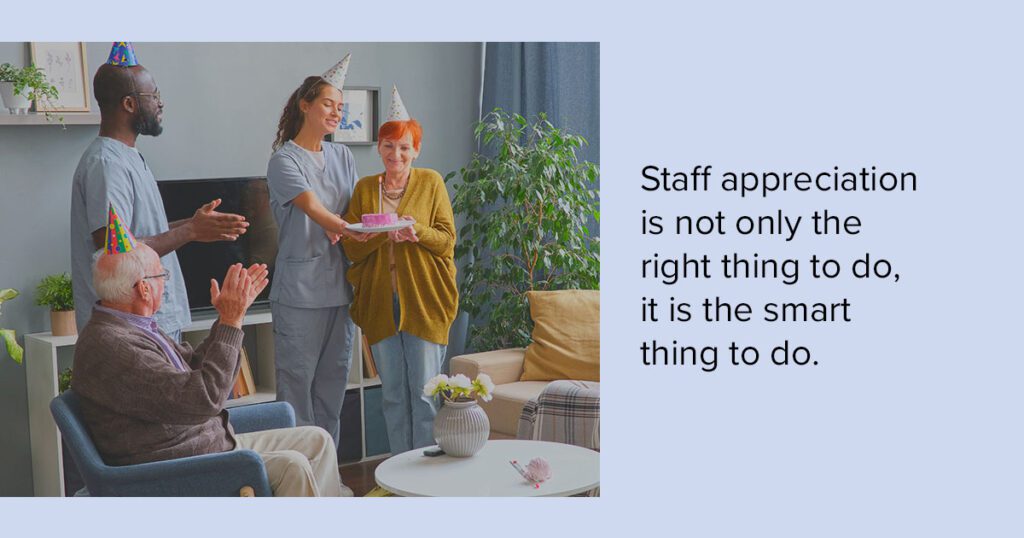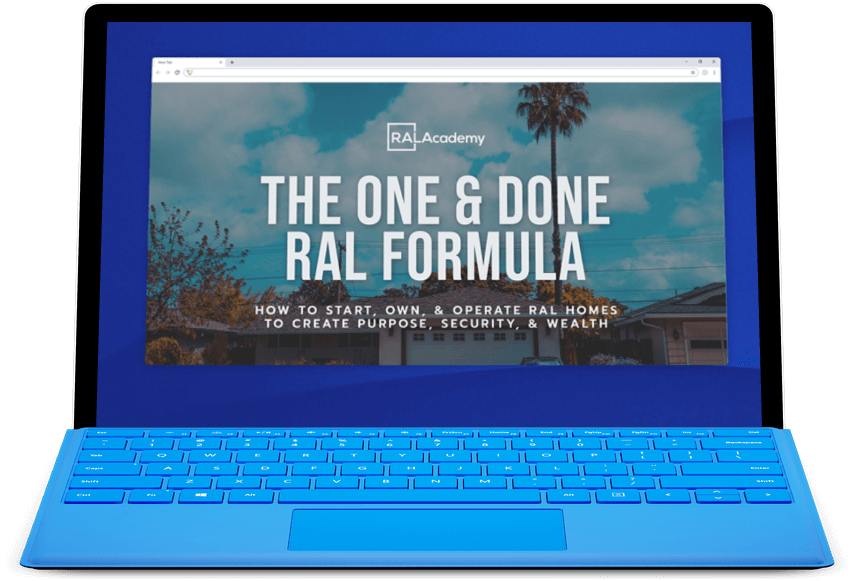Assisted living staff are the backbone of every assisted living facility. The senior care staff provides care and support to senior residents and their families, they implement the policies and procedures of the assisted living home, and they are the face of the senior housing business to the community.
From housekeeping jobs in nursing homes to assisted living directors, it takes a team committed to working together to care for those who cannot care for themselves with love and compassion.
In this blog, we will explore the many staff roles that make up an assisted living team, the requirements and qualities necessary for each of these roles, what it’s like volunteering at an assisted living facility, and how to apply for senior living positions.
Additionally, for those who own or are looking to operate an assisted living home, we will also explore where to find assisted living employees, how to hire the best senior living staff for your business, strategies for getting the most out of your employees, staff-to-resident ratios, the niche market of memory care and so much more.
Investing in senior housing is incredibly rewarding. If you want to make a positive impact in the senior living industry, there are many details that you will need to consider. One of the most important aspects of this business is staffing. How do you hire, train and retain the best staff for your residential assisted living facility? This guide will answer these questions and more, giving you practical tips and advice to build a strong team that will ensure your success. Whether you are new to this field or you have some experience, this guide will help you improve your staffing strategies and overcome common challenges.
Working At An Assisted Living Facility Or Nursing Home
Working at an assisted living facility offers a rewarding and challenging career path. It requires a whole host of qualities, chief among them being compassion, patience, and dedication to help seniors live with dignity and independence. In this article, you will find insights into what it’s like to work in this field, what type of person succeeds, and what rewards there are for assisted living staff.
Being a senior living employee is a dynamic and diverse occupation.
Every day is different, as you interact with numerous residents, their families, and other staff members. You get to meet and care for seniors with different needs, personalities, and stories to tell.
One of the most satisfying aspects of this work is seeing the residents smile and laugh. Sometimes, it’s the simple things that make them happy, like playing a game of cards, listening to their favorite music, or chatting over a cup of coffee. Other times, it’s the special occasions that bring joy, like celebrating birthdays, holidays, or milestones.

Being a part of these special moments and making them feel valued and appreciated is one of the most rewarding feelings.
Another rewarding part of this job is helping the residents maintain their independence and dignity. Care staff do all they can to respect the choices and preferences of their residents, encouraging them to do as much as they can for themselves.
Assisted living care staff also assist their residents with daily tasks that they may need help with, such as bathing, dressing, or taking medications. The goal is always to try to make these activities as comfortable and pleasant as possible.
Typical Duties Of Assisted Living Staff
When most people think of senior housing or nursing homes, what comes to mind is often images they’ve seen in films where large numbers of docile elderly people sit and watch TV all day. But, working in a retirement facility, nursing home, or assisted living home is anything but boring.
There is always something going on. Senior citizens are like anyone else; they all have their own habits, preferences, desires, hopes, and dreams. The main difference is that they don’t have the physical mobility they once enjoyed and therefore require assistance with certain activities.
That is where senior living employees come in. An assisted living job description can be as varied as the numerous types of senior care facilities out there. Some of the typical tasks that assisted living or nursing home staff may perform include:
- Helping residents with personal care, such as bathing, grooming, dressing, or toileting.
- Assisting residents with mobility, such as transferring from bed to wheelchair, or walking with a walker.
- Providing medication reminders or administration, as authorized by the resident’s physician.
- Monitoring residents’ health and well-being and reporting any changes or concerns to the supervisor.
- Providing companionship and emotional support to residents, such as listening to their stories, playing games, or reading books.
- Encouraging residents to participate in social and recreational activities, such as exercise classes, art projects, or music therapy.
- Communicating with residents’ families and updating them on their loved one’s condition and progress.
- Maintaining a clean and safe environment for residents, such as changing linens, doing laundry, or disposing of trash.
Along with all the positive interactions found in the assisted living environment, caregivers and assisted living staff may also have to deal with more difficult situations, such as medical emergencies, behavioral issues, or emotional distress.
Understanding the needs and preferences of each resident while ensuring their comfort and safety and following the policies and regulations of the facility can be a balancing act at times. The best employees are usually those who are flexible and can balance all of these critical elements well.

What Type Of Person Succeeds Working At An Assisted Living Facility?
Working at an assisted living facility is not for everyone. It takes a special kind of person to succeed in this field. Some of the qualities that are essential for working at an assisted living facility are:
- Compassion: Staff have to genuinely care about the well-being and happiness of the seniors they serve. It is important to empathize with their feelings and respect their dignity and autonomy.
- Patience: Staff need to be able to handle stressful and demanding situations with calmness and professionalism. They should be flexible and adaptable to the changing needs and moods of the residents.
- Dedication: Staff must be committed to providing the residents with the best possible care and service. Staff must be reliable and responsible.
- Communication: Staff must communicate effectively with residents, families, and other staff members, actively listening, speaking clearly, writing accurately, and using appropriate body language.
- Teamwork: Staff need to be able to work well with others in a collaborative and respectful manner, sharing information, giving feedback, accepting criticism, and resolving conflicts.
Working With Seniors Can Be Very Rewarding
Working at an assisted living facility can be very rewarding in many ways. Some of the benefits that staff enjoy are:
- Personal satisfaction: Feeling proud and fulfilled by making a positive difference in the lives of seniors and witnessing residents’ gratitude and appreciation for the work.
- Professional growth: It affords the opportunity to learn new skills and knowledge that can enhance career prospects. Staff may also receive training and certification opportunities that can increase their qualifications in future jobs.
- Social connection: It offers the chance to build meaningful relationships with residents, families, and colleagues. Being a part of assisted living staff also creates a sense of belonging and camaraderie among the team, the residents, and their families… being a part of something bigger than oneself.
- Financial compensation: Assisted living staff can earn a competitive salary and benefits package that supports their personal and financial goals.
Working at an assisted living facility is a noble and rewarding profession that can enrich one’s life as well as the lives of seniors. Those interested in pursuing this career path should start by researching different facilities in their area, applying for open positions, or volunteering at a local senior center to see if this is the right opportunity for them.
Five Categories of Staff at RAL
Now let’s talk about the different staffing levels and what career opportunities are available. There are many types of senior housing, from continuing care retirement communities (CCRC) to nursing homes, skilled nursing facilities, and small boutique residential assisted living homes. Each type of senior living option requires differing levels of care and, therefore, different staff roles to fill those requirements.
While assisted living facilities vary in size, services, and quality, they all have one thing in common, they need qualified and dedicated staff to ensure the well-being and safety of their residents.
Staff Requirements for Assisted Living
There are many departments in a senior housing business, such as administration, nursing, caregiving, housekeeping, maintenance, security, and activities. Each department has its own roles and responsibilities, but they all work together to provide residents with a comfortable and supportive environment. The staff requirements of larger assisted living facilities can differ greatly from those of smaller, boutique ALFs.
If you are considering investing in an assisted living home or a career in an assisted living facility (ALF), you may wonder what staff requirements are needed to provide quality care to the residents. ALFs are settings that offer seniors housing, supportive services, personalized assistance with activities of daily living (ADLs), and some level of health care. ALFs are not nursing homes and do not require 24-hour medical care, service, or supervision. However, they do need sufficient and competent staff to meet their residents’ diverse and changing needs.

In the list below, we will explore some common staff requirements for ALFs. Please note that these requirements may vary depending on the size, type, and location of the facility and the specific services and programs offered. Therefore, it is always advisable to check with the state licensing agency or facility for the most accurate and updated information.
Below are some of the most common positions at a typical assisted living facility.
Career People
Working at a retirement home or assisted living facility can be a rewarding career choice for anyone who enjoys helping others and making a difference. There are many benefits of working at an assisted living home, including:
- Flexible schedules: Depending on position and availability, staff can choose to work full-time, part-time, or per diem shifts that suit their lifestyle.
- Competitive pay: Depending on education, experience, and location, staff can earn a competitive salary that reflects their skills and responsibilities.
- Benefits package: Depending on the employer, staff can enjoy a comprehensive benefits package that may include health insurance, a retirement plan, paid time off, tuition reimbursement, and employee discounts.
- Career advancement: Depending on performance, qualifications, and goals, staff can advance their careers by taking on more responsibilities, obtaining additional certifications or degrees, or applying for higher-level positions within the facility or organization.
- Professional development: Depending on the employer, staff can access various opportunities for professional development, such as training programs, workshops, seminars, conferences, and mentorship programs that can enhance their knowledge, skills, and competencies.
- Personal satisfaction: Depending on their personality, values, and passions, staff can find personal satisfaction by providing quality care, support, and companionship to residents who appreciate their efforts.
Despite the numerous benefits of working at an assisted living facility, it is not always an easy job and can be challenging and demanding at times.
Some of these challenges include:
- High workload: Depending on the size, staffing level, and insight of the facility, staff may have to handle a high workload that requires multitasking, prioritizing, and problem-solving skills.
- Physical and mental stress: Depending on the nature and intensity of the work, staff may experience physical and mental stress that can affect their health and well-being. Some staff may have to deal with heavy lifting, injuries, infections, emergencies, conflicts, complaints, or emotional issues.
- Burnout and turnover: Depending on the work environment and culture of the facility, staff may experience burnout, and the business might see an increased level of staff turnover. This has the potential to reduce motivation, engagement, and performance. As in any business, depending on the facility and how it is run, staff may have to cope with low morale, poor communication, lack of recognition, support, and resources.
Unfortunately, not all assisted living facilities are run with the seniors’ safety and comfort as a chief concern. Sadly, some ALFs are run with profit as the priority, and just like in any other industry, certain business owners may choose to cut corners, causing issues for their residents and staff. Depending on the policies and procedures of the facility and the state regulations and laws, some staff may encounter ethical and legal issues that can affect their professional reputation and liability. They may have to deal with abuse, neglect, fraud, malpractice, violations, and lawsuits.
This is why it is so critical for AL business owners and operators to get the proper training and support, so they avoid resorting to a profit-first mentality. The RAL Academy was founded with the purpose of changing the landscape of senior living in America for the better. Our expert assisted living professionals have been in this industry for years and know how to build, manage, operate, and thrive in this business. And we are in the business of teaching others to replicate our success because we believe that our nation’s seniors deserve the best.

Assisted Living Director (sometimes known as Administrator or Operator)
Becoming a director, operator, or administrator of an assisted living facility might be a great choice for those interested in working with older adults and managing a healthcare facility.
The administrator is the person who is responsible for the day-to-day operations, including staff management, resident care, regulatory compliance, policies and procedures, and financial matters. This includes ensuring compliance with state regulations, licensing requirements, and accreditation standards.
The director also handles resident admissions, contracts, complaints, and grievances.
In the case of RAL business models, like the immensely successful models taught at the RAL Academy, the operator works directly under the owner and, depending on the business structure, can often overlap in terms of responsibilities with the owner. They might also work in partnership with the owner.
An assisted living facility operator will have various responsibilities involving business, staff, and residents. Some of these primary duties may include:
- Planning and organizing the services and programs offered by the facility, such as dining, housekeeping, transportation, wellness, recreation, etc.
- Staffing and directing the personnel who work in the facility, such as nurses, caregivers, cooks, maintenance workers, etc. This includes hiring, training, supervising, evaluating, disciplining staff members, and providing development and coaching opportunities.
- Marketing and budgeting the facility to ensure its financial viability and occupancy rate. This includes developing a marketing plan, setting fees and rates, collecting payments, managing expenses, and preparing financial reports.
- Ensuring compliance with state and federal regulations and standards that govern assisted living facilities. This includes maintaining proper records, licenses, certifications, inspections, audits, etc.
- Setting goals and objectives for the facility and measuring progress.
- Building good relationships with residents and their families and ensuring their satisfaction and well-being. This includes conducting resident assessments, developing care plans, addressing complaints and concerns, resolving problems, and providing support and guidance.
- Implementing and monitoring safety protocols and emergency procedures to protect the health and safety of residents and staff. This includes ensuring proper sanitation, infection control, fire prevention, security, etc.
- Responding to emergency or critical situations and resolving issues or complaints.
In general, the administrator must meet these minimum licensing requirements:
- Have a valid certificate or license from the state, which usually requires completing a training course and passing an exam.
- Complete continuing education units every two years to maintain their certification or license.
- Be at least 21 years old and have a high school diploma or GED.
- Some states may also require some college education and/or experience in health care or senior services. For example, in California, an administrator of a facility with 16-49 residents must have 15 college units and one year of experience, while an administrator of a facility with 50 or more residents must have two years of college and three years of experience.
Beyond the basic technical requirements a director of an assisted living facility should also have relevant education, training, and experience. The minimum qualifications may vary depending on the level of the facility and the state or region, but generally requires:
- A bachelor’s degree in health management, business administration, nursing, or a related field.
- A certification or license in nursing or another health care profession if clinical services are part of the services provided.
- Several years of experience in working or managing an assisted living facility or another healthcare setting.
ALF directors may also benefit from having a master’s degree in health administration or a related field, which can offer more advanced knowledge and skills in managing a healthcare facility. Pursuing additional certifications or courses in areas such as coaching, learning and development, emergency preparedness, or ethical leadership may also be advantageous.
Being a director of an assisted living facility is a challenging job. It requires a lot of dedication, compassion, leadership, and problem-solving skills. This role requires balancing the needs and interests of the residents, their families, staff, regulators, and owners. The director must also be flexible and adaptable to changing situations and challenges.
For those interested in becoming a director of an assisted living facility, you can start by researching the requirements and regulations in your area. You can also look for job openings or volunteer opportunities in assisted living facilities to gain exposure and experience. You can also network with other professionals in the field and seek mentorship or guidance from someone already working as a director.
Being a director of an assisted living facility is not for everyone. It is a demanding but fulfilling career that requires passion, commitment, and resilience. If you think you have what it takes to be a successful leader in this field, you can start preparing yourself today by pursuing the education, training, and experience you need.
Medical and HealthCare
Assisted Living Medical Director
The Medical Director is the physician in charge of the overall healthcare strategy of the facility. The position supervises the nursing staff, coordinates with other healthcare providers, and develops policies and procedures for infection control, medication management, emergency response, and end-of-life care. This position usually exists in larger facilities, most often in skilled nursing facilities.

Assisted Living Staff Nurse
This position is typically filled by an RN or a licensed practical or vocational nurse (LPN or LVN) who provides direct care to residents.
A staff nurse assesses resident needs, administers medications, performs treatments and procedures, documents care, and communicates with other healthcare professionals.
A licensed nurse must also complete continuing education units every two years to maintain their license.
Some states may require a licensed nurse to be on-site or on-call at all times or for a certain number of hours per day or week. For example, in Florida, a facility must have a licensed nurse on-site for at least 20 hours per week for every 100 residents.
Many assisted living facilities, especially smaller ones, typically don’t have RNs on staff.
Assisted Living Nursing Assistant
A certified nursing assistant (CNA) or a personal assistant assists residents with basic activities of daily living, such as bathing, dressing, grooming, eating, toileting, and transferring. A nursing assistant also helps with housekeeping tasks, laundry, meal service, and recreational activities. This is also a role that is usually only at larger facilities.
Assisted Living Caregivers
Caregivers are the lifeblood of an assisted living facility and it is critical for success that the owners and operators of an ALF business understand how to find, train and retain the best care staff available. The difference between the most successful assisted living facilities and mediocre ones often comes down to care staff; how they are trained, supported, empowered, held accountable, and rewarded for their services.
Assisted living caregivers are responsible for:
- Helping residents with their daily activities, such as bathing, dressing, grooming, eating, and using the bathroom.
- Providing companionship and emotional support to residents and building trusting relationships with them.
- Ensuring that residents are taking their prescribed medications and reporting any health concerns or issues to the supervisor.
- Maintaining a clean and safe environment for the residents and assisting them with laundry, cooking, and cleaning tasks.
- Organizing and leading group activities and outings for the residents to promote their social and physical well-being.
- Keeping accurate records of resident activity, behavior, and mood and communicating with the management and co-workers regularly.
To be an assisted living staff member, applicants generally need:
- To be at least 18 years old with a high school diploma or equivalent.
- Experience working with elderly or disabled people or a relevant certification, such as CNA or CPR.
- A friendly, compassionate, and professional attitude and excellent interpersonal skills.
- A good physical fitness and stamina to perform various tasks and lift or move residents when needed.
- A willingness to learn new skills and follow the policies and procedures of the assisted living facility.
Some states may require direct care personnel to have specific training hours before they can work independently with residents. For example, direct care personnel in New Hampshire must complete at least 12 hours of training within 30 days of hire and at least 12 hours of training annually thereafter.
Although the qualifications needed to become an effective caregiver might seem less than many other ALF staff roles, the importance of this position cannot be overstated. These members of your team are responsible for most of the interaction with your residents and their families. They have personal relationships with seniors in the facility unlike any other. Well trained and motivated caregivers can anticipate the needs and wants of most of their residents, and they can often respond to potential issues before they even become a problem. If you own or operate an assisted living home, time spent training, developing and appreciating your caregivers will repay you and your business many times over.
Activities Director for Assisted Living Facilities
The person who fills this position plans and coordinates recreational and social activities for residents. An activities director assesses resident interests and preferences, creates activity calendars and newsletters, organizes events and outings, and facilitates group participation.
In smaller assisted living facilities, caregivers often take on a number of these roles, depending on how the owner structures the workload. In residential assisted living homes, for example, care staff might perform the above mentioned duties of the caregiver, custodian, activities director, etc.
Smaller RAL homes usually have fewer than 16 residents, so the staff requirements are much less than that of the large hospital-like facilities. A handful of caregivers with the right training, along with an operator/administrator, can handle all of the duties of day-to-day operations, and anything outside of their training or ability can be contracted out to local professionals as needed.

Volunteers for Assisted Living
Many assisted living staff are drawn to the job because of a desire to help people. Some have a strong connection with seniors in particular.
And in many cases, assisted living “staff” aren’t truly staff but volunteers who give freely of their time because, quite frankly, they get more out of the experience than they give.
But what is the experience like at an assisted living home?
Picture it…You arrive at Sunnybrook Assisted Living first thing Saturday morning, ready to volunteer for a few hours. As you walk through the front doors, you’re greeted by the familiar sterile scent of cleaning products mixed with lavender air freshener. One of the staff members welcomes you with a smile and asks how your week has been. You chat for a moment before heading to the common room where some of the residents have gathered.
As you enter, you see the familiar faces of folks you’ve come to know over your weeks volunteering. There’s Betty, who loves to talk about her grandkids. And there’s Stan, who cracks jokes, trying to get a laugh. You make your way around the room, saying hello to each person, asking how they’re doing today. Most are happy for someone to talk to. One woman tells you about the sweater she’s knitting. A man asks if you caught last night’s baseball game on TV. You do your best to have a meaningful interaction with each person.
After chatting for a while, you ask if anyone wants to play a game of bingo. Several residents perk up at the suggestion. You begin handing out bingo cards and calling out numbers. There are smiles and cheers as residents get closer to winning. When Betty wins the first game, she beams with pride. You continue playing a few more rounds, celebrating each winner.
Before you know it, your volunteer shift is over. As you prepare to leave, you feel thankful to have spent the morning with this group of elders. Though you came here to be helpful, you realize they did something for you, too – they made you feel less alone. Volunteering at Sunnybrook is becoming the highlight of your week as you form meaningful connections with people you may not have met otherwise. You say your goodbyes, already looking forward to next Saturday.
There is real beauty in the connections made and nurtured at assisted living homes across the nation. Sure, not every day is this calm and relaxing, but for the most part, it’s just a group of seniors going about their day like anyone else. And being a part of a senior’s life during their twilight years is a really special thing.

Contractors
Nutritionists or Assisted Living Chefs
Many seniors struggle with maintaining a healthy diet, especially if they have chronic conditions, mobility issues, or cognitive impairments. That’s why having a chef or nutrition specialist in an assisted living facility can make a big difference in their quality of life. There are so many benefits of having a professional who can prepare and plan nutritious meals for the residents, for example:
- They can cater to individual dietary needs and preferences, such as allergies, intolerances, diabetes, heart disease, or vegetarianism.
- They can ensure that the meals are balanced, varied, and appealing, with enough protein, fiber, vitamins, minerals, and fluids to support the seniors’ health and well-being.
- They can monitor the residents’ food intake and weight changes, and adjust the portions and ingredients accordingly.
- They can educate the residents and their families about the importance of nutrition and hydration, and provide tips and resources on how to eat well at home or when dining out.
- They can create a positive and social dining experience for the residents, where they can enjoy their food in a comfortable and friendly environment.
By providing residents with delicious and nutritious meals, they can improve their physical and mental health, prevent malnutrition and dehydration, and enhance their overall satisfaction with life.
Having a chef or nutrition specialist in an assisted living facility is not only a convenience, but also a significant draw for potential clients to an assisted living facility. When families see that a residential assisted living business focuses on the details like nutrition, they will feel more comfortable entrusting their loved one to that facility.
Housekeeping Jobs In Nursing Homes
Housekeeping jobs in nursing homes and assisted living facilities are in high demand. This staff role ensures residents have a clean, tidy, and sanitary living space.
Housekeeping staff are trained and experienced in handling different cleaning tasks, such as dusting, vacuuming, mopping, sanitizing, and disinfecting. They also take care of laundry, bed making, trash removal, and other chores that might be difficult or inconvenient for the residents to do on their own.
Housekeeping services in an assisted living facility are beneficial for the residents’ physical health and hygiene and their mental and emotional well-being. A clean and organized living space can reduce stress, improve mood, and enhance productivity. It can also make the residents feel more comfortable and at home in their new environment.
Housekeeping services in an assisted living facility are usually included in the monthly fee that the residents pay. The frequency and scope of the services may vary depending on the facility and the level of care that the residents require. Some facilities may offer daily or weekly housekeeping services, while others may offer them on an as-needed basis. Some facilities may also allow the residents to customize their housekeeping services according to their preferences and budget.
Custodian
The Custodian is a worker who performs general cleaning duties in the facility, such as sweeping, mopping, dusting, vacuuming, sanitizing, and disposing of trash.
Maintenance Staff
The maintenance staff performs repairs and maintenance tasks in the facility, such as fixing plumbing, electrical, heating, cooling, and security systems. A maintenance staff also inspects and tests equipment and systems for safety and functionality. For smaller facilities, these roles
usually aren’t on the regular payroll, but rather, the work is contracted out to local professionals when needed.
Security Staff
This role ensures the security and safety of the facility, staff, and residents. A security staff patrols the premises, monitors cameras and alarms, controls access points, responds to emergencies, and reports incidents.
Hiring Staff
If you run an assisted living facility, you know how important it is to have a team of qualified, compassionate and reliable staff who can provide the best care for your residents. But finding and hiring the right people can be challenging, especially in a competitive market at times when the demand for caregivers is high. How can you attract, screen and retain the most qualified assisted living caregivers for your business?
We have a few tips for effective hiring at an assisted living facility.
Define your ideal staff profiles.
Before you start looking for candidates, you need to have a clear idea of what kind of staff you are looking for. What are the skills, qualifications, certifications and experience that you require? What are the personality traits, values and attitudes that you expect? What are the specific duties and responsibilities that the staff will have in your facility? Write down your ideal staff profiles and use them as a guide for your hiring process.
Advertise your job openings effectively.
Once you have defined your ideal staff profiles, you need to craft compelling job descriptions that showcase the benefits of working for your facility, such as competitive pay, flexible hours, training opportunities, career advancement, recognition and rewards, etc. You also need to highlight the mission and vision of your facility, the culture and values that you promote, and the impact that your staff have on the lives of your residents. Use clear and concise language that appeals to your target audience and avoid jargon or vague terms. Post your job description on various platforms, such as online job boards, social media, local newspapers, community bulletin boards, etc. You can also ask for referrals from your current staff, residents’ families, or other contacts in the industry.
Screen your candidates carefully.
After you receive applications from interested candidates, you need to screen them carefully to narrow down your pool of potential hires. You can use various methods to screen your candidates, such as phone interviews, online assessments, background checks, reference checks, etc. The goal is to verify the information that they provided in their resumes and cover letters, and to evaluate their suitability for the role based on their skills, qualifications, experience and personality. You should also look for red flags that may indicate a poor fit, such as gaps in employment history, frequent job changes, negative feedback from previous employers or references, etc.
Conduct in-person interviews.
The next step is to invite the most promising candidates for in-person interviews at your facility. This is your opportunity to get to know them better and to assess their fit with your facility’s culture and values. You should prepare a list of behavioral and situational questions that relate to the role and the challenges that they may face in your facility. For example, you can ask them how they would handle a difficult resident, a medical emergency, a conflict with a co-worker, etc. You should also observe their body language, communication skills, attitude and professionalism during the interview.

Offer a trial period or a shadowing opportunity.
Before you make a final hiring decision, you may want to offer a trial period or a shadowing opportunity to your top candidates. This will allow you to see how they perform on the job and how they interact with your staff and residents. You can also get feedback from your current caregivers who can mentor or supervise them during this period. A trial period or a shadowing opportunity can help you confirm your hiring choice or identify any issues that may affect their performance or fit.
Hire the best fit and provide ongoing support.
After you have completed all the steps above, you are ready to hire the best fit for your facility. You should make a formal job offer that includes the details of the compensation package, benefits, expectations and policies of your facility. You should also provide a comprehensive orientation and training program that covers all the aspects of the role and the facility’s operations. You should also assign a mentor or a partner who can guide them through their first days or weeks on the job. You should also provide ongoing support and feedback to help them grow and improve their skills and performance.
By using these methods you can avoid the most common mistakes in hiring staff and find the most qualified assisted living caregivers for your business. This will not only benefit your facility’s reputation and profitability but also enhance the quality of life of your residents.
Where To Find Quality Residential Assisted Living Staff
Making the decision to move a loved one into an assisted living facility is difficult. Families want to ensure their loved one receives the best possible care in a comfortable environment. That is why it is so important to provide quality care. And the way you provide quality care is with quality, reliable and caring staff. In order to help you find and hire the best for your business, here are some tips on where to find good residential assisted living staff.
Recruitment Agencies
Specialized recruitment agencies can help you find qualified candidates to fill assisted living staff positions. Look for agencies that focus specifically on senior healthcare and assisted living roles. They will have access to a pool of workers with experience caring for seniors and meeting their unique needs. The recruitment agency does the screening and background checks, saving you time in the hiring process.
Online Job Boards
Websites like Indeed, LinkedIn, and specialty medical job boards often list openings for assisted living staff. You can post the job directly on these sites to reach interested candidates. Be sure to describe the role and duties, qualifications, salary, and benefits. You can search resumes and profiles to find candidates with relevant experience. Those seeking jobs in this field are likely checking the job boards routinely.
Social Media
Don’t underestimate the power of social media for finding potential hires. Post about openings on your facility’s social pages and ask followers to share with qualified candidates. You can also join industry-specific groups on sites like Facebook and ask members if they know anyone searching for this type of position. Those active in the senior care social media space include many medical professionals.
Professional Associations
Professional organizations and associations for healthcare workers are also good resources. Reach out to groups for nurses, nursing assistants, social workers, physical therapists, and other relevant roles. Ask if they can share your job posting with their membership. Some groups cater specifically to those working in assisted living. Their members are likely looking for new opportunities.
Referrals
Don’t forget the power of word-of-mouth. Personally reach out to staff you already employ and ask if they know of anyone who would excel in an open position. Satisfied staff members usually have connections to others who would also take pride in the work. And other facilities in your area may have contacts for candidates looking to make a move.
By tapping into specialized recruiters, online postings, social media groups, professional associations, and referrals, you expand your reach to find qualified assisted living staff. Take time to communicate the caring atmosphere and mission of your facility to attract dedicated applicants ready to serve your residents.
Assisted Living Staff Appreciation
As an employer, you know how important it is to show appreciation to your staff, especially in a challenging and rewarding field like assisted living. Your staff members are the ones who provide care, comfort, and support to your residents, and they deserve to be recognized for their hard work and dedication. But how can you show appreciation to your staff in a meaningful and effective way? Here are some ideas that you can implement at your assisted living facility.
Celebrate milestones and achievements.
Whether it’s a birthday, an anniversary, a promotion, or a certification, make sure to celebrate your staff members’ personal and professional milestones. You can send them a card, a gift basket, or a personalized message. You can also organize a party or a luncheon for the whole team to join in the celebration. This will make your staff feel valued and appreciated for their contributions and accomplishments.
Provide feedback and recognition.
One of the best ways to show appreciation to your staff is to provide them with regular and constructive feedback and recognition. You can do this by having one-on-one meetings, performance reviews, or employee surveys. You can also create a recognition program that rewards your staff for their excellence, innovation, or teamwork. You can give them certificates, plaques, trophies, or gift cards. You can also showcase their achievements on your website, newsletter, or social media platforms. This will boost your staff’s morale and motivation and encourage them to keep up the good work.
Offer training and development opportunities.
Another way to show appreciation to your staff is to offer them training and development opportunities that will help them grow their skills and knowledge. You can do this by providing them with access to online courses, webinars, workshops, or conferences. You can also sponsor their tuition fees or certification exams if they want to pursue further education or credentials. You can also create a mentorship program that pairs up experienced staff with new hires or junior staff. This will show your staff that you care about their career growth and development and that you support their learning goals.
Create a positive work environment.
A positive work environment is essential for showing appreciation to your staff. You can create a positive work environment by promoting a culture of respect, trust, and collaboration among your staff members. You can also provide them with adequate resources, equipment, and support that they need to do their jobs effectively and efficiently. You can also ensure that your staff have a healthy work-life balance by offering them flexible schedules, paid time off, or wellness programs. You can also solicit their feedback and suggestions on how to improve the work environment and implement their ideas whenever possible. This will show your staff that you value their opinions and input and that you want them to be happy and satisfied at work.
Express gratitude and appreciation regularly.
The simplest and most powerful way to show appreciation to your staff is to express gratitude and appreciation regularly. You can do this by saying thank you, please, or good job whenever they do something well or go above and beyond their duties. You can also write them a note, an email, or a text message expressing your gratitude and appreciation. You can also surprise them with flowers, chocolates, or coffee as a token of your appreciation. This will show your staff that you notice and appreciate their efforts and that you don’t take them for granted.
Showing appreciation to your staff is not only the right thing to do but also the smart thing to do. By showing appreciation to your staff, you will increase their loyalty, retention, productivity, and performance. You will also enhance their well-being, happiness, and satisfaction. Most importantly, you will create a strong bond between you and your staff that will make your assisted living facility a great place to work and live.

Staff-To-Resident Ratios for Assisted Living
One of the most important factors that affect the quality of care in ALFs is the staffing ratio, i.e. how many caregivers per resident in assisted living.
A low staff-to-resident ratio means that one caregiver cares for many residents, while a high staff-to-resident ratio means that one caregiver cares for fewer residents.
Why is the staff-to-resident ratio important? Well, it can affect the level of attention, assistance, and personalization that each resident receives. A higher staff-to-resident ratio can result in more desirable, personalized care since caregivers are responsible for fewer residents at one time. It’s ideal for seniors who need more frequent assistance or have complex care needs. A lower staff-to-resident ratio can work well for seniors who need minimal assistance and are more independent. However, it can also mean that caregivers are stretched thin and may not be able to respond quickly or adequately to residents’ needs.
Unfortunately, there are no federal standards for staffing ratios in ALFs, and many states do not specify how many staff are required for each resident or each level of care. Instead, they use vague terms such as “sufficient”, “adequate”, or “appropriate” to describe the staffing requirement.
This means that each facility has to determine its own staffing ratio based on its resident population, service offerings, physical layout, etc. However, some states do provide some guidance or minimum standards for staffing ratios in ALFs. For example:
- California ALF staffing requirements: a facility with 1-15 residents must have at least one staff member awake and on duty at all times; a facility with 16-100 residents must have at least two staff members awake and on duty at all times; and a facility with more than 100 residents must have at least three staff members awake and on duty at all times.
- New Hampshire ALF staffing requirements: a facility must have at least one staff member per eight residents during waking hours and one staff member per 16 residents during sleeping hours.
- Florida ALF staffing requirements: a facility must maintain the following minimum staff hours per week: 168 staff hours for 1-15 residents; 212 staff hours for 16-25 residents; 253 staff hours for 26-35 residents; 294 staff hours for 36-45 residents; 335 staff hours for 46-55 residents; 378 staff hours for 56-65 residents; 420 staff hours for 66-75 residents; and for every 20 additional residents over 75, add 42 staff hours per week.
Big-box assisted living facilities often have poor staff-to-resident ratios and the level of care provided for each resident can feel downright neglectful.
So, how does one find out the staff-to-resident ratio of an assisted living facility? Unfortunately, there is no easy answer to this question. Unlike nursing homes, which are regulated by the federal government and must report their staffing levels, assisted living facilities are regulated by each state and have different rules and requirements. Some states may have minimum standards for staffing ratios, while others may leave it up to each facility to determine their own staffing needs. Some states may require facilities to disclose their staffing ratios to prospective residents or families, while others may not.
Another thing to consider is that not all staff members are directly involved in providing care to residents. Some staff members may have other roles, such as administration, maintenance, housekeeping, or landscaping. Therefore, a facility may have a high overall staff-to-resident ratio, but a low direct care staff-to-resident ratio.
Furthermore, the staff-to-resident ratio can vary depending on the time of day, the day of the week, and the season of the year. Generally, there are more staff members available during the day than at night, since many residents sleep through the night and require less assistance. There may also be more staff members on weekdays than on weekends or holidays, when some staff members may take time off. The staffing levels may also fluctuate depending on the demand for services or the turnover rate of employees.
Whether you are looking for an assisted living home for a loved one, or you are starting an assisted living business of your own, it’s important to understand staff-to-resident ratios and what that says about an ALF business. It is not always a definitive measure of quality or suitability, but it is a significant factor in how people choose the senior living options they select.
Tips For Finding & Applying For A Job At An Assisted Living Facility
If you are an operator, administrator, caregiver or support staff and you are looking for a new opportunity in one of these roles, here are some tips to help you out:
- Do your research.
Before applying for a job at an ALF, do some research on the facility and the organization. Learn about their mission, vision, values, services, quality standards, accreditation status, reputation, and reviews. Find out what they are looking for in their staff and what they offer in terms of compensation and benefits.
- Update your resume.
After doing your research, update your resume to highlight your relevant education, experience, skills, and achievements that match the job requirements and expectations. Use clear and concise language that showcases your qualifications and value proposition. Include keywords and phrases that specifically relate to the position and the facility to which you are applying.
- Write a cover letter.
Along with your resume, write a cover letter that expresses your interest and enthusiasm for the job and the facility. Explain why you are a suitable candidate for the position and how you can contribute to their goals and objectives. Use a professional and courteous tone that reflects your personality and communication style.
- Prepare for the interview.
Before going for the interview, prepare yourself by reviewing your resume, cover letter, and research. Anticipate possible questions that you might be asked, such as:
- What are your strengths and weaknesses as a worker?
- How do you handle stress, conflict, and emergencies?
- How do you communicate and collaborate with other staff, residents, and families?
- How do you plan, organize, and prioritize your tasks?
- How do you ensure quality, safety, and compliance?
- What are your career goals and expectations?
- Etc.
Practice answering these questions with confidence, clarity, and honesty. Provide specific examples from your previous or current work experience that demonstrate your skills, abilities, and achievements.
- Dress appropriately.
On the day of the interview, dress appropriately for the position and the facility. Choose an outfit that is clean, neat, comfortable, and professional. Avoid wearing anything that is too casual, too flashy, or too revealing. Accessorize with minimal jewelry, makeup, perfume, or cologne.
- Be punctual.
Arrive at the interview location at least 15 minutes before the scheduled time. This will give you enough time to check in, relax, and get ready. If you are running late or cannot make it to the interview, call or email the interviewer as soon as possible to apologize and reschedule.
- Be polite.
During the interview, be polite and respectful to everyone you meet, from the receptionist to the interviewer. Greet them with a smile, a handshake, and eye contact. Introduce yourself with your name and the position you applied for. Thank them for their time and opportunity.
- Be positive.
Throughout the interview, be positive and enthusiastic about the job and the facility. Show them that you are interested in learning more about them and working with them. Avoid speaking negatively about your previous or current employers, coworkers, or residents. Focus on your strengths, accomplishments, and potential.
- Be honest.
Above all, be honest about yourself, your qualifications, your expectations, and your limitations. Do not exaggerate or lie about anything on your resume, cover letter, or interview. If you do not know the answer to a question or have a gap in your work history, admit it and explain it truthfully. Honesty is the best policy when it comes to applying for a job at an ALF.
Working at an ALF can be a fulfilling career choice for anyone who wants to make a positive impact. At the RAL Academy, we appreciate anyone who dedicates their time and energy to care for our nation’s seniors. It is such a rewarding career, and if you are even remotely interested in pursuing it, we suggest you get involved, whether from the investment side or as a member of an assisted living team. You won’t regret it.
Senior Care Training for Assisted Living Staff
Assisted living facilities provide housing, meals, and assistance to seniors and adults with disabilities who need help with daily activities but don’t require the skilled medical care of a nursing home. Working in an assisted living facility requires proper training to provide residents with the best care. Here’s an overview of the training assisted living staff typically receive:
Initial Orientation and Basic Skills Training
When starting work at an assisted living facility, new staff will go through an orientation to familiarize themselves with the facility’s policies, procedures, and layout. They’ll receive training on basic skills like proper lifting techniques to avoid injury when assisting residents with mobility. Training on infection control, emergency procedures, and compliance with healthcare regulations is also standard. Dementia training can be required as well depending on the type of facility and if residents suffer from Alzheimer’s or related conditions.
Ongoing Personal Care Training
Depending on their role, staff can receive more extensive training on providing daily personal care to residents. This may include classes on bathing, grooming, and dressing residents, as well as providing medication reminders and other types of assistance. Certified nursing assistants working in assisted living facilities typically complete a state-approved CNA training course. Other staff may be trained on the job to help residents with activities like dressing, eating, and moving between their bedroom and activity room.
Specialized Dementia Care Training
Given the prevalence of Alzheimer’s and dementia in assisted living populations, many facilities provide extra training to help staff properly care for residents with cognitive impairments. This includes learning strategies for addressing behavioral issues and communicating effectively with those who have memory loss. Developing the patience and empathy required to care for those with dementia is emphasized. We will explore this niche of assisted living more in the following section.
Nurse Training
In some states, a licensed nurse must be on staff at larger assisted living facilities. Nurse training involves completing a certified nursing program to gain the medical knowledge needed for tasks like administering medication, changing wound dressings, and monitoring chronic health conditions. Nurses oversee the care of nurse aides and other staff. This role is generally not used in smaller residential assisted living homes that provide assistance, but no clinical medical care.
Continuing Education Requirements
Ongoing continuing education is mandatory for assisted living staff in most states. Required yearly training hours vary by state but help staff refresh their skills and keep up-to-date on the latest care methods, regulations, and procedures. Continuing education aims to improve the quality of care provided to residents.
Working in an assisted living facility requires dedication, compassion, and the right training. Proper initial and ongoing training gives staff the knowledge and skills to provide professional and thoughtful care to senior residents. It is vital for creating a supportive community where residents can live with dignity and enjoy their lives in comfort.
Staffing Requirements For Memory Care
Memory care is a specialized type of assisted living care for people with Alzheimer’s disease, dementia, and other cognitive impairments. Memory care assisted living facilities offer activities and programs that stimulate the mind and enhance the quality of life of residents.
One of the most important aspects of memory care is the staff. The staff members who work in memory care facilities need to have certain qualifications, skills, and traits to provide the best possible care for residents. Here are some of the basic staff requirements for typical memory care assisted living facilities:
Qualifications
Staff members who work in memory care facilities need to have appropriate education and training in dementia care. They should have a minimum of a high school diploma or equivalent, and preferably some college education or certification in health care or related fields. They should also have completed courses or workshops on dementia care. The RAL Academy has specific training for memory care facilities, along with expert staff who have years of experience in this ALF niche.
Skills
Staff members who work in memory care facilities need to have various skills to effectively communicate and interact with residents. They should have excellent verbal and nonverbal communication skills, such as speaking clearly and respectfully, listening actively and empathetically, using gestures and body language, and reading cues and signals from residents. They should also have good interpersonal skills, such as being friendly, compassionate, patient, flexible, and respectful of residents’ preferences, needs, and dignity. Moreover, they should have problem-solving skills, such as being able to identify and address issues or concerns that arise in the course of care, such as behavioral changes, medical emergencies, or safety hazards.
Traits
Staff members who work in memory care facilities need to have certain traits that make them suitable for working with people with cognitive impairments. They should have a passion for helping others and a genuine interest in learning about residents’ backgrounds, stories, and personalities. They should also have a positive attitude and a sense of humor that can help them cope with the challenges and stress of working in memory care. They should also have a high level of professionalism and ethics that guide them to follow the policies and procedures of the facility and respect the rights and privacy of residents.
Staff members who work in memory care facilities play a vital role in providing quality care for residents with cognitive impairments. They need to have specific qualifications, skills, and traits that enable them to perform their duties effectively and compassionately. By meeting these staff requirements, memory care facilities can ensure that residents receive the best possible care and support for their physical, mental, and emotional well-being.
Assisted Living Investment Opportunities
There are so many opportunities to get involved in the ever-growing senior housing industry. Whether you are considering opening up your own assisted living home, investing in someone who is starting their own RAL business, or becoming a staff member at an assisted living facility, we are here to help you succeed. The RAL Academy is determined to help change the face of senior housing by improving standards of care and increasing the number of good choices that families have when they need to find a home for a loved one.
We feel honored to be able to serve and support America’s seniors who have so much wisdom and experience to offer. They have taught so many of us so much about life, gratitude, and compassion and though they are in their twilight years, they still have so much more to offer. We hope that by sharing this information, it will inspire others to consider working in this field and to appreciate the work that good residential assisted living homes do in their communities. If you have questions about the topics discussed in this article or any other topic around assisted living feel free to schedule a call or email our expert support team.




